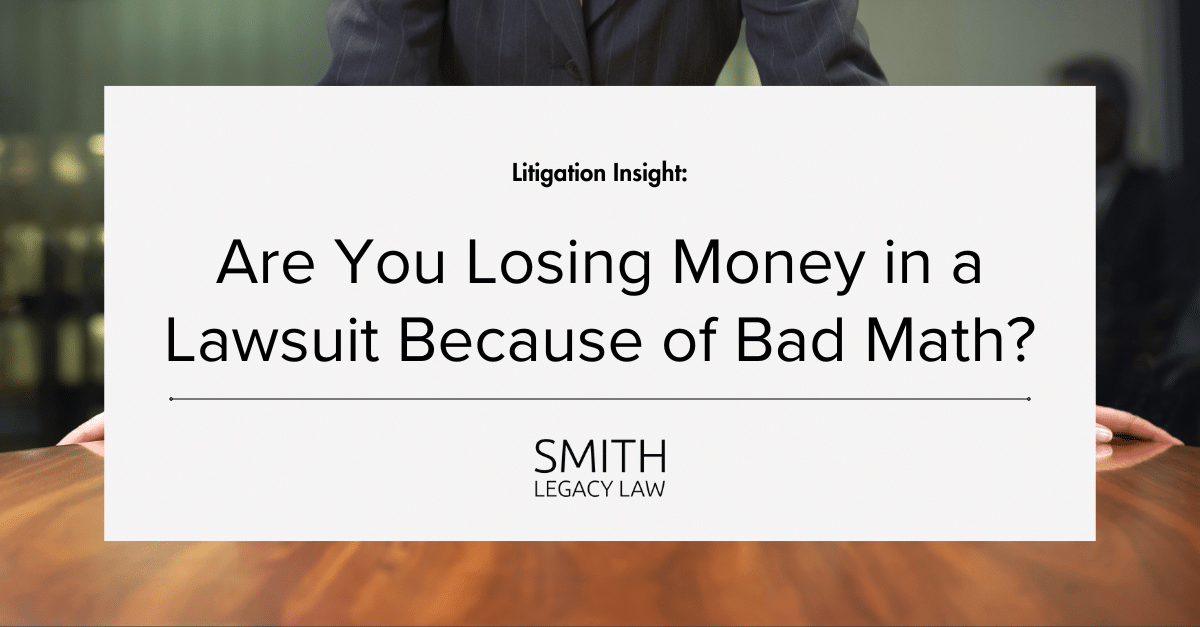As children in school, most of us were taught to “check your math” before handing in an assignment. Good advice in class but in a lawsuit, you need to go further and consider whether the one checking the math is doing it correctly. Analyzing and calculating numbers aren’t as straightforward as we’d like to think. The ones doing the math may not be qualified, may be using the wrong numbers or formulas, or may be drawing the wrong conclusions from the results. These mistakes can have a substantial effect on your case and cost you money. When you’re gathering information for a lawsuit, consider these issues with your attorney:
Math on Trial
The potential problems with math in litigation were examined in Math on Trial, by Coralie Colmez and Leila Schneps.
Numbers or calculations routinely pop up in court cases. For example, you may have a dispute with a contractor over how certain charges were determined. If you are getting divorced, you may need to calculate alimony or child support or determine the value of a business for purposes of equitable distribution. These are relatively simple issues involving arithmetic or multiplication, and most attorneys and judges have no trouble making arguments or reaching conclusions in such cases. However, it is crucial to examine numbers closely because incorrect calculations may cost you financially.
A much higher level of understanding is required when cases involve statistical evidence from which inferences might be drawn regarding the likelihood of an event occurring or the existence of a certain fact. “ For example, if actuarial evidence is being presented, are the odds of one person living past the age of 80 1 in 100 or a 1 in 10? And have those probabilities been accurately calculated?
Fortunately, we have a legal system that relies on both sides presenting evidence that the judge or jury uses to determine the relevant facts under the applicable legal principles. Evidence derived from mathematical calculations, experiments, and repeated observations can have a powerful effect on a factfinder. However, attorneys can challenge such evidence in the courtroom on various grounds.
Checking the Checker
Numbers are only as good as the data that has been gathered and the expert evaluating the data. Accordingly, your attorney has to consider the following issues in presenting or challenging mathematical evidence:
- Is the checker qualified? Typically, a witness, usually an expert, is called to testify about how they made their calculations. The attorney must verify that the expert truly knows what they’re talking about and is qualified to make the evaluation.
- What data did the checker use? The information used in the calculation may be incomplete or misleading making the results incorrect.
- What is the basis for the expert’s opinion? The attorney can question the expert to draw out their key assumptions and conclusions to look for problems in their process, results, or analysis.
- What resources are available to challenge or counter the accuracy, legitimacy, or applicability of the math-based calculations or conclusions? Judges or juries, called upon as factfinders, must be able to fairly and fully evaluate the evidence. That may mean bringing in additional experts to present alternate scenarios or calculations.
- Do the parties and factfinders have the requisite knowledge to make a decision? Mathematical concepts can be complicated and Math on Trial calls into question whether justice can be served if the players in the legal system are scientifically, mathematically, or logically illiterate. A skilled attorney must educate the parties and factfinders effectively to help ensure they understand the numbers and conclusions.
Math on Trial does a good job of illustrating how poorly understood or misunderstood concepts coupled with mathematical calculations can lead to injustice. In the wrong hands, bad math can be costly (and even deadly in criminal cases). As a result, you want an attorney with the skills and experience to challenge math that leads to an unfair result and costs you money.
If you are involved in a dispute or considering litigation, contact us for a consultation to learn how we can assist you in your matter.
